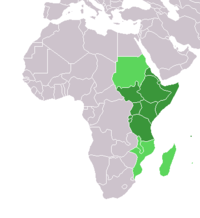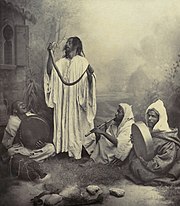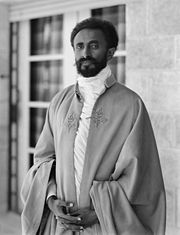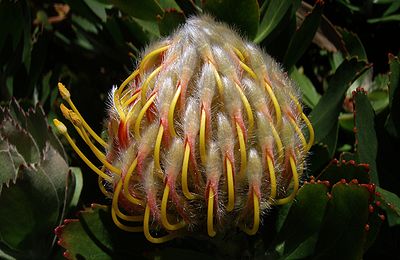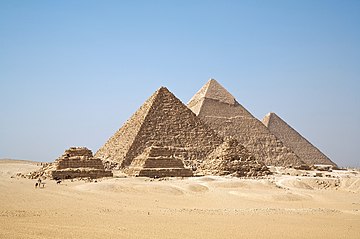Portal:Africa



Africa is the world's second-largest and second-most populous continent after Asia. At about 30.3 million km2 (11.7 million square miles) including adjacent islands, it covers 20% of Earth's land area and 6% of its total surface area. With nearly 1.4 billion people as of 2021, it accounts for about 18% of the world's human population. Africa's population is the youngest among all the continents; the median age in 2012 was 19.7, when the worldwide median age was 30.4. Based on 2024 projections, Africa's population will reach 3.8 billion people by 2099. Despite a wide range of natural resources, Africa is the least wealthy continent per capita and second-least wealthy by total wealth, ahead of Oceania. Scholars have attributed this to different factors including geography, climate, corruption, colonialism, the Cold War, and neocolonialism. Despite this low concentration of wealth, recent economic expansion and a large and young population make Africa an important economic market in the broader global context. Africa has a large quantity of natural resources and food resources, including diamonds, sugar, salt, gold, iron, cobalt, uranium, copper, bauxite, silver, petroleum, natural gas, cocoa beans, and.
Africa straddles the equator and the prime meridian. It is the only continent to stretch from the northern temperate to the southern temperate zones. The majority of the continent and its countries are in the Northern Hemisphere, with a substantial portion and a number of countries in the Southern Hemisphere. Most of the continent lies in the tropics, except for a large part of Western Sahara, Algeria, Libya and Egypt, the northern tip of Mauritania, and the entire territories of Morocco, Ceuta, Melilla, and Tunisia, which in turn are located above the tropic of Cancer, in the northern temperate zone. In the other extreme of the continent, southern Namibia, southern Botswana, great parts of South Africa, the entire territories of Lesotho and Eswatini and the southern tips of Mozambique and Madagascar are located below the tropic of Capricorn, in the southern temperate zone.
Africa is highly biodiverse; it is the continent with the largest number of megafauna species, as it was least affected by the extinction of the Pleistocene megafauna. However, Africa also is heavily affected by a wide range of environmental issues, including desertification, deforestation, water scarcity, and pollution. These entrenched environmental concerns are expected to worsen as climate change impacts Africa. The UN Intergovernmental Panel on Climate Change has identified Africa as the continent most vulnerable to climate change.
The history of Africa is long, complex, and varied, and has often been under-appreciated by the global historical community. In African societies the oral word is revered, which has led anthropologists to term them oral civilisations rather than literate civilisations. The historical process is largely a communal one, with eyewitness accounts, hearsay, reminiscences, and occasionally visions, dreams, and hallucinations, crafted into oral traditions. Time is sometimes mythical and social, and truth generally viewed as relativist. The lack of comprehensive written records has meant that African historiography was largely conceived by outsiders (Europeans and Arabs) with still tasked with building the institutional frameworks, incorporating African epistemologies, and representing an African perspective.. (Full article...)
Selected article –
East Africa, also known as Eastern Africa or the East of Africa, is a region at the eastern edge of the African continent, distinguished by its geographical, historical, and cultural landscape. Defined in varying scopes, the region is recognized in the United Nations Statistics Division scheme as encompassing 18 sovereign states and 4 territories.
East Africa is acknowledged as the cradle of early modern humans, who first emerged around 200,000 to 300,000 years ago before spreading globally though Madagascar was only settled 3000 years ago. (Full article...)
Featured pictures –
Did you know (auto-generated) -

- ... that when the pastor of an African-American church bought the El Dorado, one newspaper wrote that "its occupants are white, and were white"?
- ... that the Enterprise, a black newspaper in Omaha, supported a separate African American department at the 1898 Trans-Mississippi Exposition?
- ... that Magawa, an African giant pouched rat, sniffed out more than 70 land mines in Cambodia?
- ... that South African mayor Marlene van Staden was re-elected through a coin toss?
- ... that the bronze statue atop Thomas Eyre Macklin's 1907 South African War Memorial in Newcastle became known as the "Dirty Angel"?
- ... that South African anti-apartheid activist Ebrahim Ismail Ebrahim confused warders at the Robben Island maximum security prison by playing Bollywood music?
Categories
Selected biography –
Denis Mukwege (/mʊkˈweɪɡi/; born 1 March 1955) is a Congolese gynecologist and Pentecostal pastor. He founded and works in Panzi Hospital in Bukavu, where he specializes in the treatment of women who have been raped by armed rebels. In 2018, Mukwege and Iraqi Yazidi human rights activist Nadia Murad were jointly awarded the Nobel Peace Prize for "their efforts to end the use of sexual violence as a weapon of war and armed conflict".
Mukwege has treated thousands of women who were victims of rape as a weapon of war since the Second Congo War, some of them more than once, performing up to ten operations a day during his 17-hour working days. According to The Globe and Mail, Mukwege is "likely the world's leading expert on repairing injuries of rape". In 2013, he was awarded the Right Livelihood Award for "his courageous work healing women survivors of war-time sexual violence and speaking up about its root causes." (Full article...)
Selected country –
 |
 |
||

| |||
Guinea, officially the Republic of Guinea (French: République de Guinée), is a nation in West Africa, formerly known as French Guinea. It borders Guinea-Bissau and Senegal to the north, Mali to the north and north-east, Côte d'Ivoire to the south-east, Liberia to the south, and Sierra Leone to the south-west. It encompasses the water source of the Niger, Senegal, and Gambia rivers. The name Guinea is used for the region of most of Africa's west coast south of the Sahara desert and north of the Gulf of Guinea. Guinea is sometimes called Guinea-Conakry per its capital, to differentiate it from the neighboring Guinea-Bissau (whose capital is Bissau).
Richly endowed with minerals, Guinea possesses over 25 billion metric tons of bauxite–perhaps up to one half of the world's reserves. In addition, Guinea's mineral wealth includes more than 4 billion tons of high-grade iron ore, significant diamond and gold deposits, and undetermined quantities of uranium. Soil, water, and climatic conditions provide opportunities for large-scale irrigated farming and agro industry. (Read more...)
Selected city –
Kisumu (/kiːˈsuːmuː/ kee-SOO-moo) is the third-largest city in Kenya after the capital, Nairobi, and Mombasa. It is the second-largest city after Kampala in the Lake Victoria Basin. The city has a population of slightly over 600,000. The metro region, including Maseno and Ahero, has a population of 1,155,574 people (560,942 males, 594,609 females and 23 intersex) according to the 2019 Kenya Population and Housing Census which was conducted by the Kenya National Bureau of Statistics.
Apart from being an important political city, it is one of the premier industrial and commercial centres in Kenya. It is also an intellectual city with many PhDs per capita. The city is currently undergoing an urban rejuvenation of the downtown and lower town which includes modernizing the lake front, decongesting main streets, and making the streets pedestrian-friendly. (Full article...)
In the news
- 12 February 2024 –
- Two boats collide on the Congo River near Kinshasa, Democratic Republic of the Congo; with the death toll remains unclear. (AP)
- 11 February 2024 – 2023 Africa Cup of Nations
- In association football, hosts Ivory Coast win their third Africa Cup of Nations by defeating Nigeria 2–1 in the final. Sébastien Haller scores the winning goal in the 81st minute. (The Guardian)
- 10 February 2024 – Somali civil war
- Four Emirati soldiers and a Bahraini military officer are killed, while ten other people are injured, when a soldier opens fire at a military base in Mogadishu, Somalia, before being killed in the ensuing shootout. Al-Shabaab claims responsibility. (AP)
- 10 February 2024 –
- A Eurocopter EC130 helicopter crashes near Nipton, California, United States, killing all the six people on board, including Nigerian banker Herbert Wigwe. (CBS News)
- 10 February 2024 – 2023–2024 Senegalese protests
- Violent protests occur in Senegal following an announcement by President Macky Sall that presidential elections have been delayed from February 25 to December 15. (Sky News)
- 9 February 2024 –
- At least 18 people are killed during a collision between a bus and a truck on a road in Kinshasa, Democratic Republic of the Congo. (AP)
Updated: 16:33, 14 February 2024
General images -
Africa topics
More did you know –

- ...that the 1459 Fra Mauro map (pictured) reports that "a junk from India" rounded the Cape of Good Hope in 1420, around 70 years before the navigations of Vasco da Gama?
- ...that the 1998 Sudan famine was caused by human rights abuses in the midst of the Second Sudanese Civil War?
- ...that a smokie is a West African delicacy made by blowtorching the carcass of a sheep or goat without removing its fleece?
- ...that Anne-Marie Nzié, a Cameroonian bikutsi singer, dedicated the song Liberté to President Paul Biya and his party, the Cameroon People's Democratic Movement?
Related portals
Major Religions in Africa
North Africa
West Africa
Central Africa
East Africa
Southern Africa
Associated Wikimedia
The following Wikimedia Foundation sister projects provide more on this subject:
-
Commons
Free media repository -
Wikibooks
Free textbooks and manuals -
Wikidata
Free knowledge base -
Wikinews
Free-content news -
Wikiquote
Collection of quotations -
Wikisource
Free-content library -
Wikispecies
Directory of species -
Wikiversity
Free learning tools -
Wikivoyage
Free travel guide -
Wiktionary
Dictionary and thesaurus

